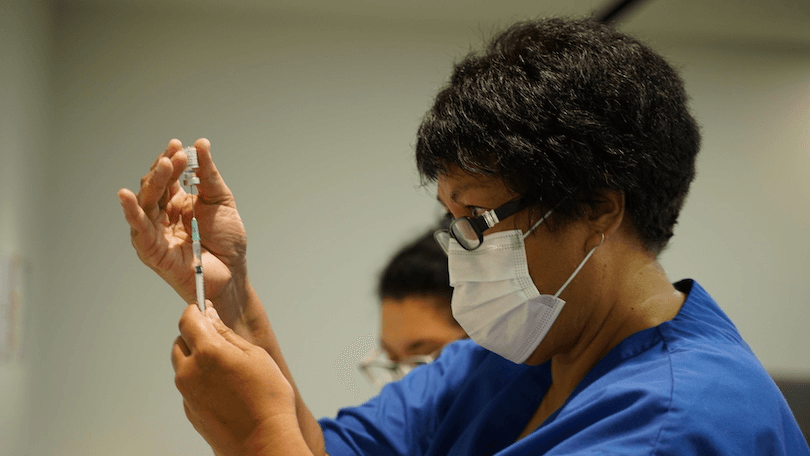We learned yesterday that a flight attendant tested positive after having had their first dose of vaccine. Mirjam Guesgen explains why vaccines take a while to kick in.
Support the Spinoff by becoming a Member – and score a Toby Morris tea towel.
Did they test positive because of the vaccine?
No. The vaccine only contains the instructions for making parts of the virus, not the live virus itself. So they weren’t infected by the vaccine.
How effective is the vaccine after the first and second doses?
Clinical trials showed that the Pfizer-BioNTech vaccine (the one currently available in New Zealand) is approximately 52% effective after the first shot and 95% effective seven days after the second.
What does effective mean?
By effective in this case they mean that the person does not become symptomatic with Covid-19. It’s still unclear whether, and how well, the Pfizer-BioNTech vaccine can protect against asymptomatic infections or curb the virus’s ability to jump from person to person.
“It seems likely that transmission will be reduced,” says Peter McIntyre, medical advisor for the Immunisation Advisory Centre. “But unlike preventing severe disease, preventing transmission (which is a much bigger ask from the vaccine) may well require two doses and even in the best case scenario will not prevent all infection and transmission.”
Efficacy also depends on how and where the trial was done, as well as what variant you’re talking about. So it’s likely we don’t have a full handle on exactly how effective the vaccines are.
Why does it take time?
The body needs time to do its thing. And by thing, that means the first dose starts the process of building up protection and the second dose reinforces it.
Siouxsie Wiles and Toby Morris produced an awesome explainer on how the vaccine works.
The fragment of genetic code (mRNA) that makes up the vaccine enters a cell and instructs it to make the coronavirus protein called spike. This is thought to only take a few hours.
But the body’s immune system then needs time to study up on the protein and then make the disease-fighting cells like B-lymphocytes that create antibodies to fight infection or T-lymphocytes that hang around in the body ready to get to action if it comes up against the virus again. That process can take several days or weeks.
The second shot basically gives the body another study session before the big exam – another chance to see the material, study up, and make some flash cards to remember the material by.
Is it surprising that they became infected after the first shot?
No. Doctors in the US said that someone getting infected after their first shot of the vaccine is like “saying someone went outside in the middle of a rainstorm without an umbrella and got wet.” The full protection isn’t there yet.
So this has happened before?
Yes. In December last year the US saw a flurry of concerned news headlines after a San Diego nurse fell ill a week after getting her first shot of the Pfizer jab.
What does this mean now?
Several health experts have reiterated the importance of public health measures like mask wearing, hand washing and social distancing alongside clinical measures (read: the vaccine) to fight Covid-19.
The vaccine is another layer of defence in the swiss cheese model, but it’s not the only one.

